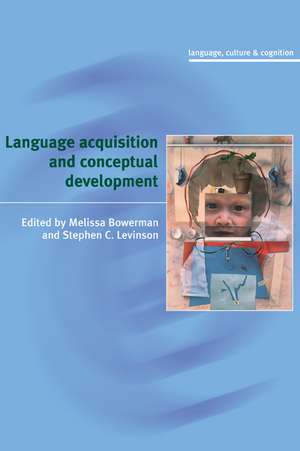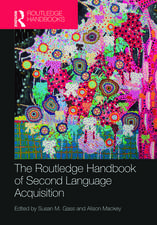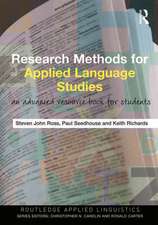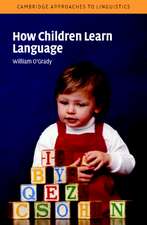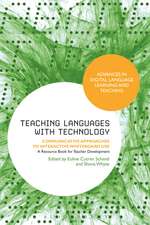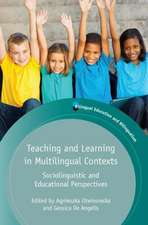Language Acquisition and Conceptual Development: Language Culture and Cognition, cartea 3
Editat de Melissa Bowerman, Stephen Levinsonen Limba Engleză Paperback – 10 ian 2001
| Toate formatele și edițiile | Preț | Express |
|---|---|---|
| Paperback (1) | 495.93 lei 6-8 săpt. | |
| Cambridge University Press – 10 ian 2001 | 495.93 lei 6-8 săpt. | |
| Hardback (1) | 735.00 lei 6-8 săpt. | |
| Cambridge University Press – 10 ian 2001 | 735.00 lei 6-8 săpt. |
Preț: 495.93 lei
Preț vechi: 557.21 lei
-11% Nou
Puncte Express: 744
Preț estimativ în valută:
94.91€ • 103.06$ • 79.72£
94.91€ • 103.06$ • 79.72£
Carte tipărită la comandă
Livrare economică 22 aprilie-06 mai
Preluare comenzi: 021 569.72.76
Specificații
ISBN-13: 9780521596596
ISBN-10: 0521596599
Pagini: 616
Ilustrații: 35 b/w illus. 32 tables
Dimensiuni: 154 x 228 x 38 mm
Greutate: 0.89 kg
Ediția:New.
Editura: Cambridge University Press
Colecția Cambridge University Press
Seria Language Culture and Cognition
Locul publicării:Cambridge, United Kingdom
ISBN-10: 0521596599
Pagini: 616
Ilustrații: 35 b/w illus. 32 tables
Dimensiuni: 154 x 228 x 38 mm
Greutate: 0.89 kg
Ediția:New.
Editura: Cambridge University Press
Colecția Cambridge University Press
Seria Language Culture and Cognition
Locul publicării:Cambridge, United Kingdom
Cuprins
Preface; Introduction; Part I. Foundational Issues: 1. The mosaic evolution of cognitive and linguistic ontogeny Jonas Langer; 2. Theories, language, and culture: Whorf without wincing Alison Gopnik; 3. Initial knowledge and conceptual change: space and number Elizabeth S. Spelke and Sanna Tsivkin; Part II. Constraints on Word Learning?: 4. How domain-general processes may create domain-specific biases Linda B. Smith; 5. Perceiving intentions and learning words in the second year of life Michael Tomasello; 6. Roots of word learning Paul Bloom; Part III. Entities, Individuation, and Quantification: 7. Whorf versus continuity theorists: bringing data to bear on the debate Susan Carey; 8. Individuation, relativity, and early word learning Dedre Gentner and Lera Boroditsky; 9. Grammatical categories and the development of classification preferences: a comparative approach John A. Lucy and Suzanne Gaskins; 10. Person in the language of singletons, siblings, and twins Werner Deutsch, Angela Wagner, Renate Buchardt, Nina Schultz and Jörg Nakath; 11. Early representation for all, each, and their counterparts in Mandarin Chinese and Portuguese Patricia J. Brooks, Martin D. S. Braine, Gisele Jia and Maria da Graca Dias; 12. Children's weak interpretations of universally quantified questions Kenneth F. Drozd; Part IV. Relational Concepts in Form-Function Mapping: 13. Emergent categories in first language acquisition Eve V. Clark; 14. Form-function relations: how do children find out what they are? Dan J. Slobin; 15. Cognitive-conceptual development and the acquisition of grammatical morphemes: the development of time concepts and verb tense Heike Behrens; 16. Shaping meanings for language: universal and language-specific in the acquisition of spatial semantic categories Melissa Bowerman and Soonja Choi; 17. Learning to talk about motion UP and DOWN in Tzeltal: is there a language-specific bias for verb learning? Penelope Brown; 18. Finding the richest path: language and cognition in the acquisition of verticality in Tzotzil (Mayan) Lourdes de León; 19. Covariation between spatial language and cognition, and its implications for language learning Stephen C. Levinson; Indexes.
Recenzii
'This thought-provoking book will challenge many existing preconceptions about the relationship between language and thought.' The Journal of The Royal Anthropological Institute
Descriere
Leading scholars examine the relationship between child language acquisition and cognitive development.
